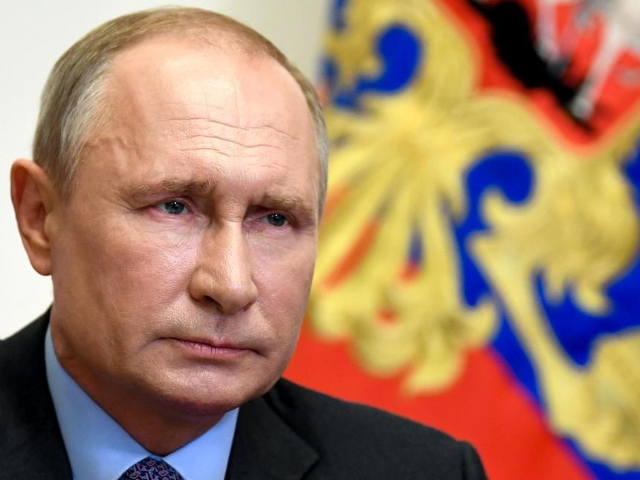A poll by the Levada Center in Russia found on Friday that more Russian citizens hope to see an end to the regime of President Vladimir Putin today than in years, at least since a 2013 poll immediately before the annexation of Crimea, Ukraine.
The Moscow Times noted the occupation of Crimea appeared to buoy Putin’s support somewhat, elevating “patriotic fervor,” but that much of that support has dwindled as Russia’s economy continues to flounder and Putin has increased repression against political dissidents.
The ongoing dispute over the arrest of opposition leader Alexei Navalny, imprisoned immediately upon his return to Russia after recovering from an attempted poisoning in Germany, has led to widespread protests across the country. Putin denies Navalny’s claims that he was behind the poisoning, telling reporters that, had he wanted Navalny dead, he would have killed him.
The poll published Friday found that 41 percent of respondents would prefer Putin not stay in power past 2024. Nearly half, 48 percent, said they supported a prolonged tenure for Putin. Men were less likely to support Putin than women and a higher percentage of young people also expressed a desire for change. Among women, 35 percent said they would want to see a change in their presidency in 2024.
“It is the highest objection to Putin’s re-election since October 2013, when the share of those opposed to the prospect of his fourth term stood at 45% against 33% who were in favor,” the Moscow Times noted.
Russia has experienced nationwide protests resulting in at least dozens of public arrests surrounding the case of Alexei Navalny, a longtime public opponent of Putin’s who has urged a change of the guard at the Kremlin. The protests intensified in January following Navalny’s arrest. On Friday, Russian authorities confirmed Navalny had been transferred out of his prison to a penal colony to complete a two-year sentence for alleged parole violations.
Last year, Navalny’s team rapidly flew him out of the country to Germany after he fell ill. German doctors announced they had found traces of Novichok, a Russian chemical weapon historically used by the government, in his system. Navalny personally accused Putin of attempting to have him assassinated when he awoke from his coma following the poisoning.
Navalny chose to return to Russia upon recovery, resulting in his immediate arrest. Despite conceding the arrest was politically motivated, the international human rights organization Amnesty International stripped Navalny of his status as a “prisoner of conscience” this week after an “orchestrated campaign” to smear his reputation, admitted spokesman Alexander Artemev.”
Independent of the Navalny case, Russians have increasingly expressed displeasure with Putin’s handling of the Chinese coronavirus pandemic, which has impacted the nation severely. Russia has documented nearly 4.2 million Chinese coronavirus cases since the pandemic began and 83,900 deaths, more than all but four other nations. The tally only takes into account official government statistics, which suggests Russia’s true toll is much higher, but likely overshadowed by the true numbers from countries like China and Iran, whose numbers experts have doubted.
Russian officials admitted in December they had significantly undercounted the number of cases and deaths in the country for months. The death toll, in particular, Moscow revealed was at least three times higher than the prior official statistics showed. The numbers also show a significantly higher death rate than many other countries, including some with higher case counts.
Doctors throughout the country have repeatedly complained that the government has not provided them sufficient personal protective equipment (PPE) or other tools to handle highly contagious cases. The complaints have corresponded to an increase in mysterious deaths of health workers in the country, a significant number of which died after, according to police, they “fell” out of the windows of tall buildings. Some reports indicated that the falls preceded arguments with Russian officials about the lack of aid.
Putin has increasingly attempted to elevate his support by warning the nation of the need of unity in the face of alleged foreign threats. This week, Putin announced that his government had evidence of unspecified Western campaigns to “destabilize” the country, ordering top counterintelligence agencies to focus on foreign governments trying to “derail our development, slow it down, create problems alongside our borders, provoke internal instability and undermine the values that unite the Russian society.”

COMMENTS
Please let us know if you're having issues with commenting.